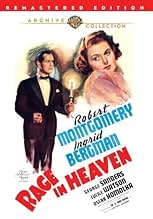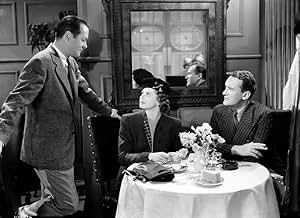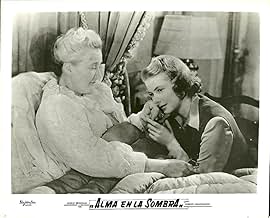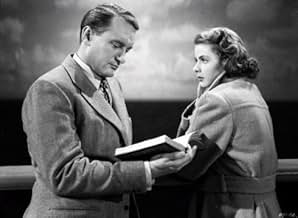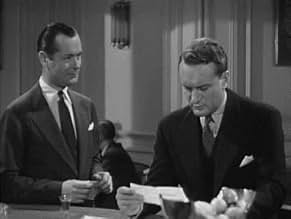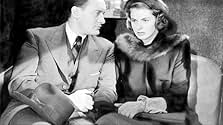ÉVALUATION IMDb
6,4/10
1,4 k
MA NOTE
Ajouter une intrigue dans votre langueRobert Montgomery and George Sanders team up to play against type in this probing psychological thriller that features Ingrid Bergman as the object of their obsessions.Robert Montgomery and George Sanders team up to play against type in this probing psychological thriller that features Ingrid Bergman as the object of their obsessions.Robert Montgomery and George Sanders team up to play against type in this probing psychological thriller that features Ingrid Bergman as the object of their obsessions.
- Prix
- 3 victoires au total
Frederick Worlock
- Solicitor-General
- (as Frederic Worlock)
Ludwig Hardt
- Durand
- (as Ludwig Hart)
Stuart Hall
- Traveling Salesman
- (scenes deleted)
Major McBride
- Bank Clerk
- (scenes deleted)
Clive Morgan
- Traveling Salesman
- (scenes deleted)
Joseph North
- Undertaker
- (scenes deleted)
Wyndham Standing
- Dr. McTernan
- (scenes deleted)
Harry Allen
- Jury Foreman
- (uncredited)
Avis en vedette
The first half of this film is a fascinating portrayal of a Paranoid Psychopath. The second half deteriorates into an in-earnest attempt to deliver a thoughtful look at someone suffering from this form of mental illness.
Ingrid Bergman, in her third Hollywood feature, is the subject of a dangerous obsession from her husband, a wealthy heir, who lacks self-esteem and lives in a constant state of jealously and prone to being easily agitated. Robert Montgomery plays the ticking bomb.
Parenthetically, Montgomery was reportedly unhappy the studio demanded he play the role because he wanted time off and therefore delivered his lines quickly and without much effort. I found this to be, ironically, effective for the character.
The great George Sanders plays the man in most danger of the lead character's pathological illness. Unfortunately, his character is given little to work with in the third act of the film.
There's a scene where a trial is held and the apathy displayed by Sanders (with the exception of one shot) is astonishing.
In the 1940s Hollywood began its fascination with stories focused on psychology. This is one of the first films in that era and unfortunately it was put in the hands of director W. S. Van Dyke, who had the reputation of working quickly and was nicknamed "One-Take Van Dyke." You can see characters trip over lines and a lack of care over the story's plot line.
Oscar Homolka seriously overplays the mental health doctor in the picture. Clearly the rage over the film's miscues should be directed at Van Dyke.
Ingrid Bergman, in her third Hollywood feature, is the subject of a dangerous obsession from her husband, a wealthy heir, who lacks self-esteem and lives in a constant state of jealously and prone to being easily agitated. Robert Montgomery plays the ticking bomb.
Parenthetically, Montgomery was reportedly unhappy the studio demanded he play the role because he wanted time off and therefore delivered his lines quickly and without much effort. I found this to be, ironically, effective for the character.
The great George Sanders plays the man in most danger of the lead character's pathological illness. Unfortunately, his character is given little to work with in the third act of the film.
There's a scene where a trial is held and the apathy displayed by Sanders (with the exception of one shot) is astonishing.
In the 1940s Hollywood began its fascination with stories focused on psychology. This is one of the first films in that era and unfortunately it was put in the hands of director W. S. Van Dyke, who had the reputation of working quickly and was nicknamed "One-Take Van Dyke." You can see characters trip over lines and a lack of care over the story's plot line.
Oscar Homolka seriously overplays the mental health doctor in the picture. Clearly the rage over the film's miscues should be directed at Van Dyke.
Lighten up reviewer and enjoy this movie for what it is. Good Old fashioned entertainment. I've watched this movie man times and always enjoy it. Aubrey Mather as Clark is worth the admission price.
"Rage in Heaven" belongs to the spate of Freudian movies of the forties: Hitchcock's "spellbound" Lang's "secret beyond the door" Tourneur's "cat people" Stahl's "leave her to heaven" Siodmak's "dark mirror" ,the list is endless.
"Rage in heaven" is an excellent underrated thriller.Although Philip's mother part is underwritten ,she predates the Hitchcockian mums ,those of "Notorious" "Strangers on a train" "Marnie" etc.Robert Montgomery whose character is the most interesting portrays a rich kid,probably victim of his over possessive mother -"he's more attractive than Ward" - A selfish paranoiac man who will not be satisfied till he destroys everything.His behavior makes sense:the cat,then the best friend (the enemy ,for his wife is in love with him),the wife and finally himself ,the doctor explains.
The screenplay might not be thoroughly original,but "Leave her to heaven" (1946) borrows Gene Tierney's diabolical suicide from it,and the final search has something of Cornell Woolrich (aka William Irish) ,notably his "phantom lady".
Three excellent actors,and a gripping story: you will not waste your time.
"Rage in heaven" is an excellent underrated thriller.Although Philip's mother part is underwritten ,she predates the Hitchcockian mums ,those of "Notorious" "Strangers on a train" "Marnie" etc.Robert Montgomery whose character is the most interesting portrays a rich kid,probably victim of his over possessive mother -"he's more attractive than Ward" - A selfish paranoiac man who will not be satisfied till he destroys everything.His behavior makes sense:the cat,then the best friend (the enemy ,for his wife is in love with him),the wife and finally himself ,the doctor explains.
The screenplay might not be thoroughly original,but "Leave her to heaven" (1946) borrows Gene Tierney's diabolical suicide from it,and the final search has something of Cornell Woolrich (aka William Irish) ,notably his "phantom lady".
Three excellent actors,and a gripping story: you will not waste your time.
One of James Hilton's lesser novels got a lesser production from MGM with his Day Of Reckoning becoming Rage In Heaven. This has to be one of the few instances where a psychiatrist saves the day.
I think it ironic that Robert Montgomery got cast in the lead here against his usual type. It must have been an easier sell to Louis B. Mayer to cast him after having proved his acting chops in Night Must Fall. Playing another charming maniac got Montgomery an Academy Award nomination in that film. So Mayer having been convinced was less reluctant to have him cast here.
When we first meet Montgomery we find him inside an insane asylum in France and while his doctor, Oscar Homolka is discussing his case, Montgomery up and escapes from the place. Making it back to Great Britain he goes back to his mother's place and Lucille Watson as the mother welcomes him, not knowing of his hiatus in the booby hatch.
She's got a nice new secretary/companion in Ingrid Bergman and Montgomery likes her lot. She likes George Sanders his good friend and incidentally it was Sander's character name under which Montgomery was in the asylum under.
Montgomery woos and wins Ingrid, he's now running Watson's factory and that makes him a big man and no doubt helps his cause with Ingrid. Sanders is now working for him. But this Othello has his own Iago inside him provoking the green eyed monster without any outside provocation.
When Bergman turns to Sanders after one of Montgomery's inexplicable rages, Montgomery conceives a diabolical plot to frame Sanders for his own murder. That's the best part of the film, there's no way Sanders could have or should have gotten out of it. Especially without Montgomery to be questioned.
I liked the fact that both Montgomery and Sanders were playing against type. Sanders is a good guy, one of the few films he's not working any angles. Ingrid was steadfast and loyal, her part's not that much of a stretch for her talents.
I won't give away the ending, but let me say it was way too contrived and coincidental. Rage In Heaven does not belong in the top tier of films for any of the three leads.
I think it ironic that Robert Montgomery got cast in the lead here against his usual type. It must have been an easier sell to Louis B. Mayer to cast him after having proved his acting chops in Night Must Fall. Playing another charming maniac got Montgomery an Academy Award nomination in that film. So Mayer having been convinced was less reluctant to have him cast here.
When we first meet Montgomery we find him inside an insane asylum in France and while his doctor, Oscar Homolka is discussing his case, Montgomery up and escapes from the place. Making it back to Great Britain he goes back to his mother's place and Lucille Watson as the mother welcomes him, not knowing of his hiatus in the booby hatch.
She's got a nice new secretary/companion in Ingrid Bergman and Montgomery likes her lot. She likes George Sanders his good friend and incidentally it was Sander's character name under which Montgomery was in the asylum under.
Montgomery woos and wins Ingrid, he's now running Watson's factory and that makes him a big man and no doubt helps his cause with Ingrid. Sanders is now working for him. But this Othello has his own Iago inside him provoking the green eyed monster without any outside provocation.
When Bergman turns to Sanders after one of Montgomery's inexplicable rages, Montgomery conceives a diabolical plot to frame Sanders for his own murder. That's the best part of the film, there's no way Sanders could have or should have gotten out of it. Especially without Montgomery to be questioned.
I liked the fact that both Montgomery and Sanders were playing against type. Sanders is a good guy, one of the few films he's not working any angles. Ingrid was steadfast and loyal, her part's not that much of a stretch for her talents.
I won't give away the ending, but let me say it was way too contrived and coincidental. Rage In Heaven does not belong in the top tier of films for any of the three leads.
I guess I'll be the resident moron of this film's comment section. I liked Rage in Heaven. It was entertaining, interesting, and involving.
I realize Robert Montgomery phoned in his role. His complete detachment makes the character evil rather than sick, and one cannot feel sympathy for him, if we were ever supposed to. The biggest problem is that his flat line readings and cool demeanor make it unbelievable that Bergman married a man so completely lacking in self-esteem, charm, and ardor.
The very young, pre-superstar Ingrid Bergman is marvelous - very fresh and vibrant in the beginning, her personality becoming more somber after a short time being married to Montgomery. And who can blame her. George Sanders is excellent, his portrayal possessing all the charm and passion Montgomery lacks.
As far as this plot being contrived, perhaps, but it was also clever. The original ending of "Fatal Attraction" was based on the same idea. Seen in today's modern perspective "Rage in Heaven" is most interesting. The obsession that Phillip had for Wade - very bizarre indeed!
I realize Robert Montgomery phoned in his role. His complete detachment makes the character evil rather than sick, and one cannot feel sympathy for him, if we were ever supposed to. The biggest problem is that his flat line readings and cool demeanor make it unbelievable that Bergman married a man so completely lacking in self-esteem, charm, and ardor.
The very young, pre-superstar Ingrid Bergman is marvelous - very fresh and vibrant in the beginning, her personality becoming more somber after a short time being married to Montgomery. And who can blame her. George Sanders is excellent, his portrayal possessing all the charm and passion Montgomery lacks.
As far as this plot being contrived, perhaps, but it was also clever. The original ending of "Fatal Attraction" was based on the same idea. Seen in today's modern perspective "Rage in Heaven" is most interesting. The obsession that Phillip had for Wade - very bizarre indeed!
Le saviez-vous
- AnecdotesW.S. Van Dyke took over the direction of the movie from Robert B. Sinclair, who became ill shortly after shooting began. Van Dyke was in the Marines, but was granted a 14-day leave to finish the picture. Neither Sinclair nor Van Dyke was available for re-takes, which were then directed by Richard Thorpe.
- GaffesThe movie commences with a quote, "Heaven hath no rage like love to hatred turned", which it attributes to Milton. The quote is in fact from William Congreve's play "The Mourning Bride".
- Citations
Stella Bergen: My life is like this clearing. Nice and peaceful with paths leading in all directions. Only, I don't know which one to take.
- ConnexionsFeatured in Ingrid (1984)
Meilleurs choix
Connectez-vous pour évaluer et surveiller les recommandations personnalisées
- How long is Rage in Heaven?Propulsé par Alexa
Détails
- Durée1 heure 25 minutes
- Couleur
- Rapport de forme
- 1.37 : 1
Contribuer à cette page
Suggérer une modification ou ajouter du contenu manquant

Lacune principale
By what name was Rage in Heaven (1941) officially released in Canada in English?
Répondre

